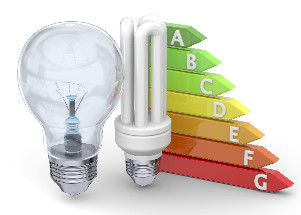The efficient use of energy, sometimes referred to as the efficiency and cost-effectiveness of energy-that is, the goal is to reduce the amount of energy required for the supply of goods and services.
The energy efficiency and conservation of energy can be defined as the level of energy consumption for the provision of this service, and, generally, they are improving in this regard.
The improvement of energy efficiency involves the improvement of the energy performance of the delivery mechanism of the various forms of energy, but it can also include the improvement of the management of the organisation's energy consumption.
The energy is so closely connected with the development of the socio-economic development, therefore, it is not difficult to imagine that this trend can be used as a means to achieve political objectives outside the energy sector. Some of the outcomes may be indirect, or it can be the result of a chain of actions, it is difficult to be attributed to this notion.

You can, however, be noted that the measures on energy efficiency and energy savings, with an impact in many areas of the economy, a lot of times, in different areas, and at the same time, and that have a direct impact in one area of the economy can affect the other.
Traditionally, the focus in this area, due to the use of the least amount of energy for the same energy services. On the other hand, this may also lead to an increase in the volume of services for the same amount of energy that is consumed.
Therefore, to increase the efficiency of the energy can be obtained, in this case, when either one of the lower power consumption in order to provide the same high level of service, or even the energy that is consumed for the highest level of service. The activities of the energy efficiency and conservation of energy can be focused primarily on:
- the management and the rational use of energy
- the power-saving mode.
The energy efficiency and energy conservation is an important aspect to be focused on other activities such as the reduction of losses in the production of energy and the increase in the activity of the industrial sector. They are important in two ways.
To understand the effect of the wave, which may occur as a result of increased energy efficiency and energy savings for the economy as a whole may be useful in the development of a deliberate policy.
Here are discussed the various benefits of the use of energy-efficient one-to-one-industry state, of the international typology. The various benefits of energy efficiency and energy saving: the increase in could take a substantial number of advantages in a wide range of industries.
A list of the most widespread a number of benefits that can be derived from these measurements:
The benefits of improving the energy efficiency and energy saving
The health and well-being
Particularly convincing evidence that the impact of energy efficiency and energy conservation in the residential sector, in the health of the population and its social effects. With a wide range of diseases, especially of respiratory tract diseases and asthma among children are closely related to the cold weather, the moisture, and mold in a residential installation.
The improvement of the energy efficiency and energy conservation in the building sector, in particular, can provide a wide range of tangible benefits for the health of the residents of the homes, businesses, and other groups, and the general public. The impact on the health, and in equal measure, this is due to the inefficiency of the housing department.
In the fight against poverty, and the availability of energy
In terms of the rise in energy prices and the financial constraints that the poor often cannot afford to pay for the service, is sufficient for the maintenance of healthy environments, life, being forced to a lack of sufficient heat in the house, and be able to tolerate the poor air quality in the indoor environment, and/or if you refuse to accept the other's necessities, such as food: this phenomenon, sometimes referred to as the "heat or food". In this situation, it is often described as "fuel poverty". The energy efficiency and conservation of energy to solve this problem is through the adoption of measures at the household level to reduce energy costs through insulation and design, delivering effective tools and equipment for space heating and water heating, and lighting, as well as the learning of an efficient use of energy among the locals.
Access to energy is essential for the exit of people out of poverty through the provision of raw materials for the development of the socio-economic development. The energy efficiency measures, with the input of the power suppliers, you can release more resources to reduce technical losses in the systems of production and distribution of electricity.
The Industrial productivity and competitiveness
There are a number of improvements in the industry performance, which could provide the efficiency of energy production and energy efficiency. These include an increased income, a more secure job, the length of stay, and improvement in the quality and launch of new products, reduce capital and operating costs, and a reduction in the consumption of scrap metal and energy. The benefits that can be obtained from industry at a global level through increasing competitiveness, and can be spread out to provide working conditions, safety and job satisfaction of the employees.
The advantages for the providers of energy and infrastructure projects

At first glance, it may seem that energy efficiency and energy conservation would be contrary to the interests of the commercial energy suppliers. However, studies have shown that the energy suppliers receive a lot of benefits in terms of providing a higher quality of energy service to customers, reduce your operating costs and increase your profits.
Up to 10% of all of the benefits of the improvements will probably be credited directly to their energy providers, which explains why so many public services are now adopting ambitious measures, demand-side management, which is conducted in many countries, laws, and obligations in this area.
The increase in the cost of fixed assets
There is some evidence that investors are willing to pay for the rent and the premium for the sale of real estate properties at the best rates of performance.
For example, it is one of the highest operating cost in most offices, and therefore, the value of the net future savings of energy can be added to the resale value of your phone. Studies have shown that the market is becoming more and more reflect these arguments.
The existence of the analysis of the data shows that "green" buildings have increased resale value and rental rates, and we also offer a full range of benefits, even beyond the value of its assets: they have the highest rate of employment, increase comfort, lower operating costs, and lower cap rates, and the highest gain in performance.
The creation of new jobs
The investment in energy efficiency and conservation of energy have a considerable potential for the creation of jobs in the short run. The pure improvement of the employment can explain the programs to improve on account of the direct creation of new jobs and, indirectly, on account of the excess of the costs to the consumer, in addition to any other benefits to the budget of the government, such as the reduction of unemployment. The direct jobs created during the implementation of the energy efficiency measures and energy-saving, easier-to-measure, and, most likely, it will be too much. Indirect local jobs can be created from the production of raw materials, however, such work may be retained only for the duration of a particular program.
The reduction in public spending related to energy is from the perspective of the public sector as a single entity in the economy. The increase of the power efficiency and energy savings will help to reduce the burden on the national budget and improve the financial balance of that system.
The safety and security of the energy
Energy efficiency plays a key role in the reduction of the dependence on imports to meet its needs and, therefore, contribute to the formation of a variety of balance-of-power. Side effects about energy security, which is structurally dependent on the energy sector in a given country.
Macroeconomic effects
To increase the efficiency and cost-effectiveness of energy may cause a significant positive macroeconomic impacts such as GDP growth, balance of trade, the restructuring of the economy, employment, competitiveness and employment. They can have a significant impact on the budget of the country. Investing is the direction that suggests that the translation of the share capital, energy, and less energy-intensive activities.
This can have significant consequences for the economy and for energy management, in general, if it involves the restructuring of the economy, the more arduous the activity.
To reduce the emission of greenhouse gases
To increase the efficiency and economy of energy, leading to a reduction in the consumption of energy from fossil fuels and to reduce emissions of greenhouse gases. Indeed, the measures are expected to contribute to a 44 per cent reduction in carbon dioxide emissions by 2035, in order to have a chance to reach the international targets on climate change.
In comparison with the other measures for the reduction of emissions of greenhouse gases, improving energy efficiency, as a general rule, it is more cost effective and can be done very quickly. The reduction in emissions has already been recognized as one of the main results of the energy efficiency measures and a lot of times it is used in and of itself, and in the evaluation of existing programs.
The reduction in the cost of energy

The reduction in the price of energy is determined by a number of factors, such as the power level of the power demand and the conditions of the market. When all other things being equal, if the demand for the services of a fall in the price of energy must fall, and it is expected that with the increase of the efficiency and economy of energy, will make it necessary to reduce the demand for energy.
The management of natural resources
Another benefit is the reduction in the demand for energy is weakening, the pressure on natural resources.
Taking into account that, by 2035, the world's supply of the routine of the oil will decrease the energy efficiency and energy conservation will be an important measure to alleviate the pressure on limited resources. The millennium development goals the achievements of the sustainable development, international labour, and access to, modern energy services is essential to ensure that the basic necessities of life, as well as the conditions for socio-economic development.
























